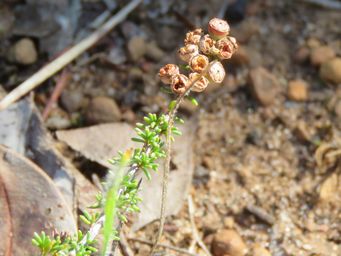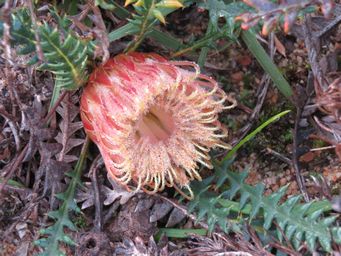Australia So Much to See
Copyright (C) 2013 AustraliaSoMuchtoSee.com. All rights reserved


Sources used for identification of wildflowers shown on these pages and regions where they occur see Credits
These pages will
feature some of the wildflowers we have photographed in Western Australia, and where possible, identified. If you
are able to help identify further flowers, or correct any I may have wrong, please contact us.
Information given for each species
will give botanical name, known common names, describe the flower, give time of year it flowered, and where it was photographed, and
the areas it occurs in. Names have been matched to Florabase which has also been used to show distribution.
See some
of these wildflower in larger sized photos on our Flickr pages.



Banksia grandis Bull Banksia, Giant Banksia, Mangite,(or Poolgarla, Beera, Bullgalla, Boolgalla, Boorarup, Biara, Boongura, Gwangia,
Peera, Pira, Mungite, Mungaitch). Bull Banksia believed to have come from the Aboriginal name of Bullgalla.
Large
flower stalks which develop into large seed cones
Summer
Bridgetown, South West Region, Western Australia, and occurs throughout
the South West, sandplains near Perth and the south coast around Albany.
Banksia dallanneyi 2007 (formerly Dryandra lindleyana), Couch Honeypot, Bullgalla, Budjan
Single, centre of plant, ground level
Winter
Bridgetown, South West Region, Western Australia and occurs in the Mid West, Coastal Wheatbelt, Perth, South West, Great Southern Regions
Winter
Bridgetown, South West Region, Western Australia and occurs in the Mid West, Coastal Wheatbelt, Perth, South West, Great Southern Regions



Banksia cirsioides 2007, (formerly Dryanda cirsioides), Thistle Dryandra.
A medium sized sprawling Dryandra shrub, with yellow
flowers in the centre of a radiating circles of foliage.
Tarin Rock Nature Reserve, Wheatbelt Region, Western Australia and occurs through the Southern Wheatbelt and Great Southern regions, extending into the coastal Goldfields to Esperance
Tarin Rock Nature Reserve, Wheatbelt Region, Western Australia and occurs through the Southern Wheatbelt and Great Southern regions, extending into the coastal Goldfields to Esperance


In a controversial move, Dryandra species were renamed as part of the Banksia family.
Dryandra species have recently (2007)
been renamed as part of the Banksia family in a controversial move. See Banksia for Banksia dallanneyi, (formerly Dryandra
lindleyana), and for Banksia sessillis (formerly Dryandra sessillis) and others.
This change is not supported by everyone.
See more here. An additional paper can be seen on Australian Native Plants Society (Australia).
These documents explain the reasons for the change on Florabase Why Dryandras have changed their name and Why names change.
These documents explain the reasons for the change on Florabase Why Dryandras have changed their name and Why names change.
F

Babingtonia camphorosmae 2015 (formerly Baeckea camphorosmae), Camphor Myrtle, Camphorwort Babingtonia, Kurren
Tiny pink five petalled
flowers approximately five millimetres across, in clusters at the end of the branches of a low growing small shrub, with fine
leaves in clusters. Seed nuts forming in photo at right. Faint camphor scent.
December January
Bridgetown, South West Region, Western Australia, and occurs throughout the Perth, Wheatbelt, South West and Great Southern regions, but not the south coastal strip






Banksia coccinea, Scarlet Banksia, Waratah Banksia, Albany Banksia, Waddib. (Photographed post flowering.)
A vivid red and white striped (with upright stripes) flower, emerging from the tip of the stems, ringed by the broad toothed leaves. Shrubs usually grow up to four metres in height, but can reach eight metres.
A vivid red and white striped (with upright stripes) flower, emerging from the tip of the stems, ringed by the broad toothed leaves. Shrubs usually grow up to four metres in height, but can reach eight metres.
Can flower between May and January.
Albany, Great Southern region, and
grows principally on sand dunes, sand flats and margins of swamps along the coastal strip from Albany to Ravensthorpe, and a little
way inland in the lower Great Southern.
Banksia ilicifolia, Holly-leaved Banksia
Flowers of yellow to red shades as they mature, in a similar shape to Banksia sessilis
blooms. Flowers emerge from the stem tips, ringed by spiky (holly-like) leaves on a shrub which can grow to twelve metres
in height. Shown here with buds forming.
Can flower at any time of the year but mostly in winter and spring
Albany,
Great Southern region, and grows along the coastal strip from Jurien Bay to Bremer Bay.
Banksia bipinnatifida subspecies bipinnatifida 2007 (formerly Dryandra bipinnatifida)
A small low growing plant with stiff double
divided foliage(above right). With only a few leaves, this Banksia has a lignotuber - and underground stem. Flowers burst
forth from the soil under the foliage. These golden-brown flowers are relatively large for the plant, being around seven or
eight centimetres long, almost twice the size of Banksia dallanneyi flowers which has a similar sized plant. This plant
is rarely seen flowering, and seems to be responsive to wet seasons.
October November
Bridgetown, South West Region, Western Australia and occurs in the Perth and South West regions.
Banksia bipinnatifida subspecies multifida occurs in the coastal Wheatbelt and Mid West.
Bridgetown, South West Region, Western Australia and occurs in the Perth and South West regions.
Banksia bipinnatifida subspecies multifida occurs in the coastal Wheatbelt and Mid West.



Bwongka is an Aboriginal name from the Avon Valley covering a number of larger Banksia shrubs.

